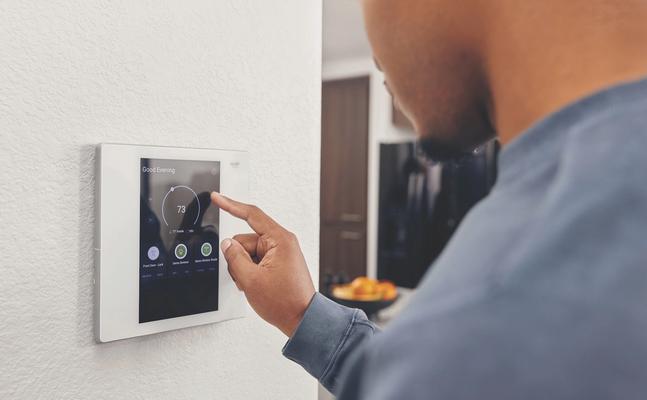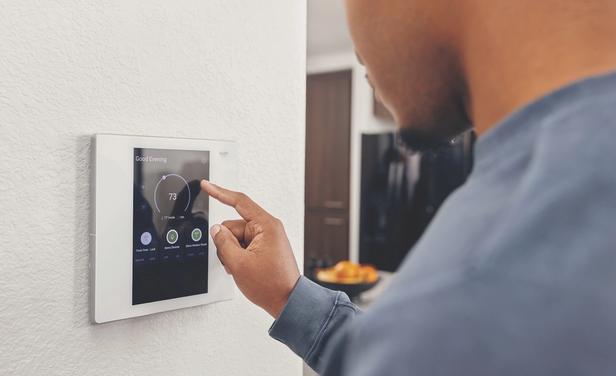Subscribe to our newsletter
In today’s multifamily sector, smart home technology isn’t just a premium amenity anymore—it’s increasingly essential. These innovations do more than enhance resident experience; they have a direct financial impact on property valuation. Smart technology drives higher net operating income (NOI), influences appraisals and sets properties up for long-term success.
For enterprise-level owners and operators, smart tech is a strategic investment that boosts asset value and keeps properties competitive.

Quantifying the ROI of smart tech for higher valuations
Smart home technology doesn’t just add convenience—it delivers real financial returns. From reducing maintenance costs to optimizing energy efficiency, the impact is measurable. By improving operational efficiency and reducing expenses, it directly contributes to increased property valuations. Smart thermostats, leak detection sensors and energy-efficient lighting help lower utility costs, mitigate risks and streamline management. These savings strengthen NOI, which plays a critical role in multifamily valuation.
According to a recent study by Multi-Housing News, properties that use smart home technology see a significant 3-5% rise in valuation and an outstanding average ROI of 30%. This demonstrates that these investments go beyond simple conveniences—they have a measurable financial impact. Properties with smart access control and security features frequently experience reduced insurance costs, further strengthening both NOI and valuation.
A Parks Associates report, “Smart Properties: The Value of IoT for MDUs Q2 2024,” provides further evidence of these substantial financial benefits. The report highlights improvements across several key areas:
“Smart building solutions have significant positive effects on operations and finances,” the report states. Specifically, MDU owners and operators reported a 20% increase in operating efficiency and 18% decrease in operating costs.
The Parks Associates report also found that smart building solutions have led to a 19% reduction in energy costs, an 18% reduction in water costs, a 16% reduction in property insurance costs and a 21% reduction in security incidents.
These improvements directly impact NOI and contribute to higher property valuations.
Appraisers assess multifamily properties based on their ability to generate income and reduce risk. By implementing smart tech, owners can provide clear, quantifiable data on operational cost savings and revenue growth, directly influencing the final appraisal.
Automation is another major benefit. Smart tech helps property teams avoid potential issues by enabling remote monitoring and predictive maintenance. Advanced sensors detect leaks or equipment failures early, preventing costly emergency repairs. This proactive maintenance strategy not only cuts expenses but also signals to appraisers that the property is operating efficiently, reinforcing a higher valuation. Moreover, AI-driven predictive analytics allow managers to anticipate maintenance needs based on historical data, further optimizing property operations. By shifting from reactive to proactive maintenance, operators can extend the lifespan of building systems and reduce capital expenditures over time.
Enhancing resident experience to strengthen property value
Smart home technology isn’t just about cutting costs—it’s also about creating a better living experience that keeps residents happy and engaged. Resident expectations have evolved. Modern renters expect homes that integrate seamlessly with their digital lifestyles. Keyless entry, access control and integrated resident portals simplify daily life, increasing satisfaction and reducing turnover rates. Fewer move-outs mean lower vacancy rates and more stable rental income, both of which are critical valuation factors.
Today’s renters expect tech-driven convenience. Properties with mobile access control, self-guided tours and in-unit automation stand out in a crowded market. For example, renters appreciate the ability to unlock their doors remotely for visitors or service providers, adjust thermostat settings from their smartphones or receive real-time notifications about package deliveries. These features support higher rent values, premium leasing opportunities and stronger occupancy rates.
The data backs it up. A PR Newswire report found a 23% increase in resident satisfaction after implementing smart features, demonstrating the connection between technology and retention.
Higher resident satisfaction reduces turnover and allows property owners to justify premium rents. Smart-enabled units can command higher rental prices, increasing overall revenue potential. This strengthens the property’s NOI and directly impacts appraisal values.
Offering app-controlled home automation features like smart lighting and voice-activated assistants further improves convenience and helps set a property apart. These personalized technology experiences create a more competitive property, leading to stronger demand and a higher perceived market value.
Future-proofing assets for market competitiveness
In a fast-changing market, properties that fail to adopt smart technology risk falling behind. Smart tech has moved from luxury to expectation. By integrating smart solutions, owners and operators can modernize their assets, enhance efficiency and attract future buyers.
Smart tech isn’t just about the present—it’s about staying competitive in the years ahead. Investors and buyers prioritize tech-enabled properties for their efficiency and tenant appeal. Properties without these upgrades risk lower demand, longer sales cycles and ultimately reduced valuations.
For enterprise owners, integrating smart home technology today helps future-proof their assets for an eventual sale or refinancing. Modernized properties with strong NOI and tech-enabled efficiencies are more attractive to institutional investors and REITs, making them easier to offload at a premium price.
Sustainability is another critical factor. With many cities introducing energy efficiency regulations, smart energy management solutions—like automated lighting and smart HVAC systems—can help properties stay compliant while cutting long-term costs. Properties that proactively adopt sustainable practices may also qualify for tax incentives and green financing options, further enhancing their valuation.

Unlocking higher valuations with SmartRent
Smart home technology isn’t just an upgrade—it’s a competitive advantage. Enterprise-level operators that embrace smart solutions can boost NOI, attract and retain residents, and position their properties for long-term market success.
Smart home technology will play an even more significant role in property valuation as the multifamily market evolves. Owners and operators who invest in these innovations now will be better positioned to achieve higher appraisals, stronger financial performance and greater overall portfolio growth.
Ready to explore SmartRent solutions?
See how SmartRent can help you boost NOI, attract residents and future-proof your multifamily properties. Schedule a demo.

